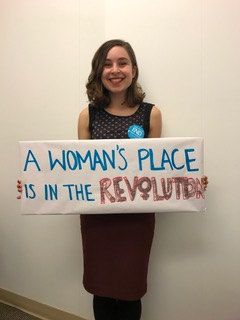Meet Sarah Levinson! She is a senior majoring in Political Science-International Relations and English.
Describe yourself and why you wanted to attend the Feminist Camp:
I am a senior Political Science and English major interested in feminism as it relates to politics and social engagement. I wanted to attend Feminist Camp in order to make my feminism more action-oriented and intersectional. I became interested in feminism through a more political, policy-focused lens as legislating to increase sociopolitical equality between all genders. Through Feminist Camp, I was able to broaden my understanding of the definition of a feminist organization and learn more daily applications of feminism in social and cultural life as well as in employment settings through a cross-section of industries. I wanted to learn what it looks like to build broad-based, inclusive, and intersectional feminist movements and network with other like-minded leadership, and Feminist Camp provided the perfect opportunity to build those connections.

Describe your favorite parts of the conference:
The most rewarding parts of the conference were definitely meeting some of the incredible leadership the organizers of Feminist Camp connected to. I particularly loved meeting influential intersectional feminist authors like Jamia Wilson and the authors of the Crunk Feminist Collection. I appreciated the balance between engaging and fun activities such as feminist films and lecture-style visits to employer’s offices. Feminist Camp perfectly balanced the types of organizations we visited from fancy for-profit office buildings in Midtown to casual comfy converted warehouse spaces at a magazine office in Brooklyn. The absolute highlights of the conference for me were meeting Gloria Steinem at a prison reform event, performing an abortion on a papaya, and visiting a live taping of Democracy Now!
Highlight information you learned on reproductive health and reproductive justice:
Everything we learned at Feminist Camp was pleasantly intentional and intersectional, so I learned about reproductive health and reproductive justice through the perspective of a very wide range of organizations and organizers. One of the days of Feminist Camp was dedicated to learning about reproductive justice. On that day, we visited the National Advocates for Pregnant Women where we learned about how pregnancy discrimination in addition to abortion restriction poses risks for women’s reproductive health and freedom overall. We also visited the Reproductive Health Access Project where we learned about reproductive health education practices in medical settings and performed abortions on papayas to learn how easy and safe abortion operations are. We also visited the National Latina Institute for Reproductive Health where we learned about intersectional organizing and how reproductive health and racial justice impact the Latina community and how people are organizing around these issues. Lastly, we visited art exhibits charting current trends in reproductive health.
Detail what you learned that you hope to never forget:
I hope to never forget the incredible passion and hard work of the people that we met at Feminist Camp. The program organizers as well as the participants put so much heart and energy into these causes and built incredible networks for themselves and the camp in general. I hope to bring that level of passion to the work that I do in the future and remember the important lessons that I learned about how feminist organizations function and how to be intentional and intersectional in all of the activism that I do and to never forget that there is a critical place for that thought in my future workplace.
Why should other students attend a Feminist Camp:
Feminist Camp is a uniquely valuable window into translating a passion for intersectional feminism and activist organizing into a career. The conference allows you access to the brilliant minds of incredible leaders in the world of progressive employment and creates a huge network of well-connected program leaders, alumni, and employers. Feminist Camp is energizing in a political and economic employment where working for a feminist-minded organization or doing social activism work may seem exhausting or frustrating. The camp absolutely changed my understanding of what my future career might look like in the best possible way.
Does this sound like something you might be interested in? Tulane undergraduate students can apply to NCI for funding to attend Feminist Camp. Email Betsy Lopez at elopez@tulane.edu for more information.
Responses have been lightly edited for length and clarity.
